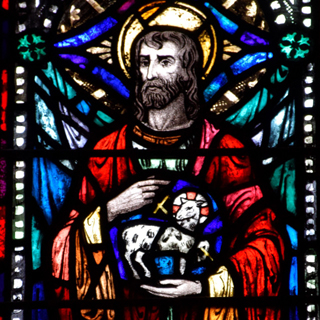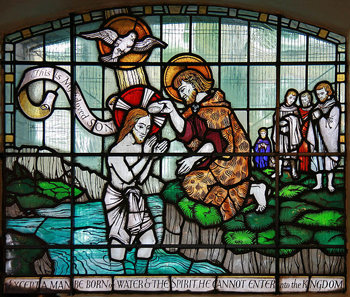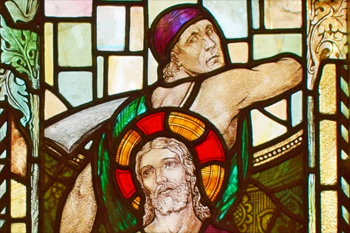For Sunday December 13, 2020
Lectionary Readings (Revised Common Lectionary, Year B)
Isaiah 61:1-4, 8-11
Psalm 126
1 Thessalonians 5:16-24
John 1:6-8, 19-28
My daughter is writing graduate school applications this month, which means she spends a lot of time crafting strategic answers to one question: “Who are you?” If you’ve ever applied for an internship, job, or grant, you know the drill. If you’ve ever obsessed over your Facebook profile, or spent hours perfecting a Tweet, you know how complicated the question can get. Who are you? What is your brand? What carefully packaged version of yourself do you wish to show the world?
Beneath the questions of presentation, though, are deeper and far more significant questions: who are you, really? When no one is watching; when you’ve let your guard down; when it’s only you and God, hidden away from the world, who are you then?
On this third Sunday of Advent, our Gospel reading gives us John the Baptizer, confronting this very question at the start of his public ministry. He has barely taken up his post at the banks of the Jordan River when his interrogators — priests and Levites from Jerusalem — show up to classify and contain him. Who is this wild, disheveled preacher calling people to repentance? Where does his authority come from? Is he crazy? Is he a threat? Is he — dare they entertain the possibility? — an actual messenger from God?
John prefaces his answer to the religious leaders by saying who he is not: “I am not the Messiah.” “I am not Elijah.” “I am not the prophet.”
Perhaps we would do well to begin where John begins. Before we can figure out who we are, we have to clarify — for ourselves and for the world — who we are not. We are not Jesus. We are not Saviours. We are not infallible. We are not omniscient.
 |
One of the costliest mistakes the historic Church has made is to claim identities, powers, and privileges that don't actually belong to us. When we Christians adopt messianic ambitions for ourselves — either personally or corporately — we hurt ourselves, we hurt others, and we hurt the cause of Christ. When we make promises we can’t keep — promises of prosperity, promises of immunity, promises of consumer-based “peace” and “blessing” — we become stumbling blocks to those who seek consolation in Jesus.
In contrast, John begins his ministry from a place of humility. He doesn’t allow his calling to go to his head. He doesn’t claim any identity that doesn’t belong to him. He makes his listeners no promises of ease and comfort; he simply asks them to prepare themselves for the One who is greater than himself. He stays in his lane. “I am not the Messiah.”
To be clear, this version of self-abnegation is not weak or masochistic. It doesn’t require a denial of John's gifts and abilities. No one who reads the prophet's story can call him anything other than strong, self-possessed, and authoritative. But John knows both the source and the purpose of his authority. Celebrity holds no attractions for him, and neither does religious or political power. Hence he carries out his vocation in the wilderness, far from the centers of power and prestige in Jerusalem.
We begin by comprehending who we are not. But as Christians, we can’t define ourselves solely in the negative — even when it’s tempting to do so. I’ve certainly done it, and perhaps you have, too. “Oh, I’m not that kind of Christian.” “I would never attend that kind of church.” “I don’t read the Bible that way.” “The Jesus I believe in has nothing to do with that theology.”
Many of us who practice some form of progressive Christianity feel an ongoing need to define ourselves in the negative, especially if we live in cultures that are post-Christian or anti-Christian. We fear being tainted by association if we don’t. I understand this impulse, and maybe it has its place, but a negative answer to the question of Christian identity isn’t a full answer. It’s not a loving, inviting, or hospitable answer. It’s a defensive answer. An answer that erects walls instead of tearing them down.
The thing is, “Who are you?” is a very large question. It demands something more embodied and invested than a string of rejections and repudiations. It asks us to do deep work. It asks us to interrogate what we hold dear, what we trust, what we love — and why. Once we've peeled away everything we are not as followers of Jesus, what’s left? After we've figured out what we don’t support, believe, espouse, or love, what version of faith remains? What positive, vibrant, living core will we offer to the world in the name of Jesus?
 |
John’s answer to the question is clear, unequivocal, and startling: “I am the voice of one calling in the wilderness, ‘Make straight the way of the Lord.’” What sort of countercultural answer is that? In a world that promises accolades to those who promote and amplify themselves, John chooses total humility instead: I am a voice pointing away from where I stand. I am a path maker for feet other than my own. I am a witness speaking on behalf of someone other than myself.
If this isn’t surprising to you, then consider again what you know of the wilderness prophet’s biography. After all, this is John the Baptist we’re talking about. John, whose very conception occasions an angelic visit. John, who leaps in his mother's womb at the first glimpse of a pregnant Mary. John, whose fiery preaching draws huge crowds to repentance. John, who sees the heavens open up and the Spirit of God descend like a dove on the newly baptized Jesus.
He is a young man who grows up with the most outsized expectations ringing in his ears. Even as a child, he feels the exhilaration and the burden of his high calling. Before he is even thirty years old, he draws crowds so vast, the religious authorities feel threatened by his very presence.
This is the man who chooses to define himself as a “voice in the wilderness.” As a prophet “unworthy to untie the thongs” of Jesus’s sandals. As no more than a forerunner. As a mere witness to Mystery.
What strikes me most about John’s story is that he continues to bear witness to this mystery even when the mystery completely baffles him. We know from other Gospel accounts that he doesn't always understand his cousin’s mission and ministry. We know that he suffers grave doubts about Jesus during the weeks or months he languishes in prison. We know that he struggles to reconcile his own assumptions about the Messiah — a Messiah of fire, judgment, and justice — with the Jesus who shows up at the Jordan, seeking baptism. A Jesus of tenderness, humility, and vulnerable-making love.
 |
And yet John stays true to his identity. His answer to the “Who are you?” question never wavers. Even when his prophetic vocation of truth-telling leads to his imprisonment, he stays true to the person God calls him to be.
The third Sunday of Advent is traditionally called “Gaudete” or “Rejoice” Sunday. In many churches, the penitential purple of the season is put aside this weekend, in favor of a lighter, happier rose. Most of the lectionary readings emphasize celebration, anticipation, and joy.
This feels right to me, given our Gospel. We do tap into joy when we rightly understand who we are in the kingdom and economy of God. New life and fresh joy well up when we align our self-understanding to God’s calling, and recognize that we, like John, are meant to point away from ourselves, towards Jesus. Joy surprises us when we decide to forge paths in the wilderness, when we make way in difficult places for someone greater than ourselves. Joy multiplies when we level oppression, injustice, and suffering, so that all flesh can see God together.
What is your answer to the question of identity? Who are you during this sacred season of preparation? Are you a voice? A witness? A path maker? A wilderness dweller? Whatever your desert looks like, wherever your “Jordan River” is located, who are you in that place? Very soon, the one you’re waiting for this Advent will come, and the question on his lips will demand a whole-hearted response: “Who do you say that I am?” Consider the possibility that these are linked questions. Who you are shapes who he becomes in your life. The self you cultivate and curate is the self who will receive the Christ, and make him known to a world that needs him. So again: Who are you?
Debie Thomas: debie.thomas1@gmail.com
Image credits: (1) Picfair.com; (2) Wikimedia.org; and (3) Lo and Behold.





